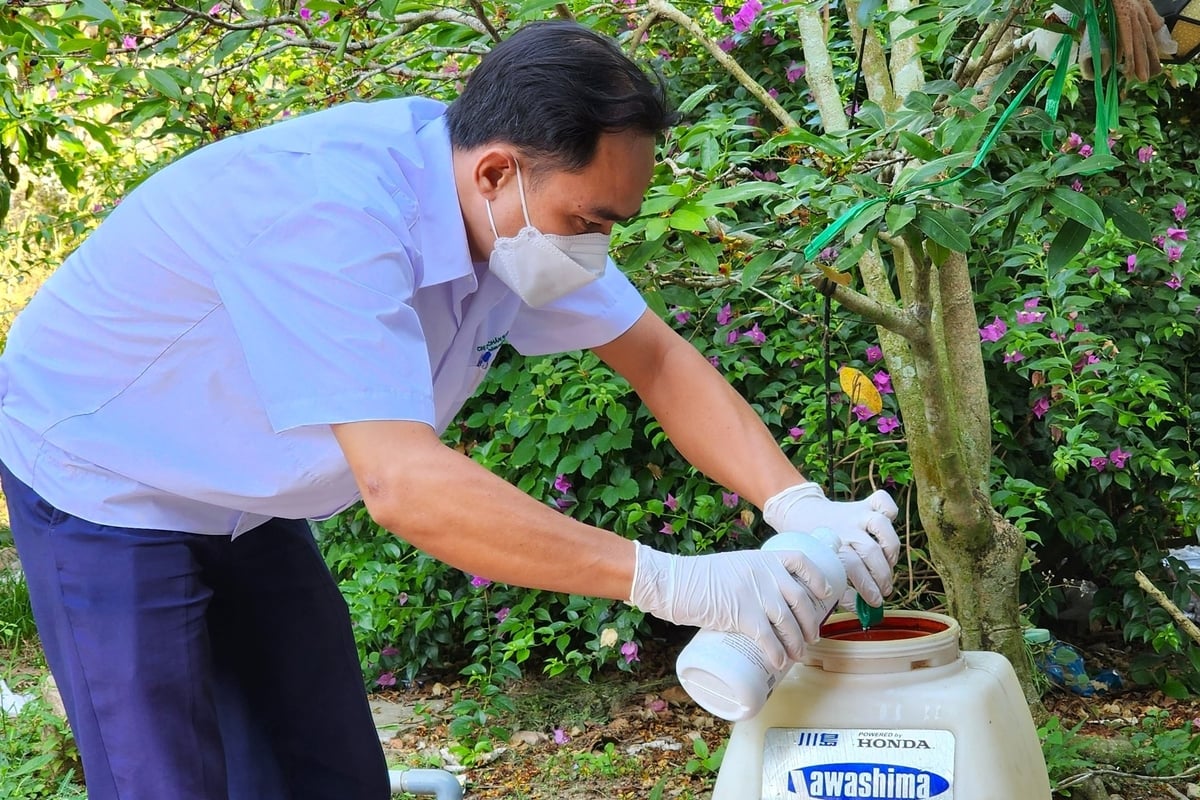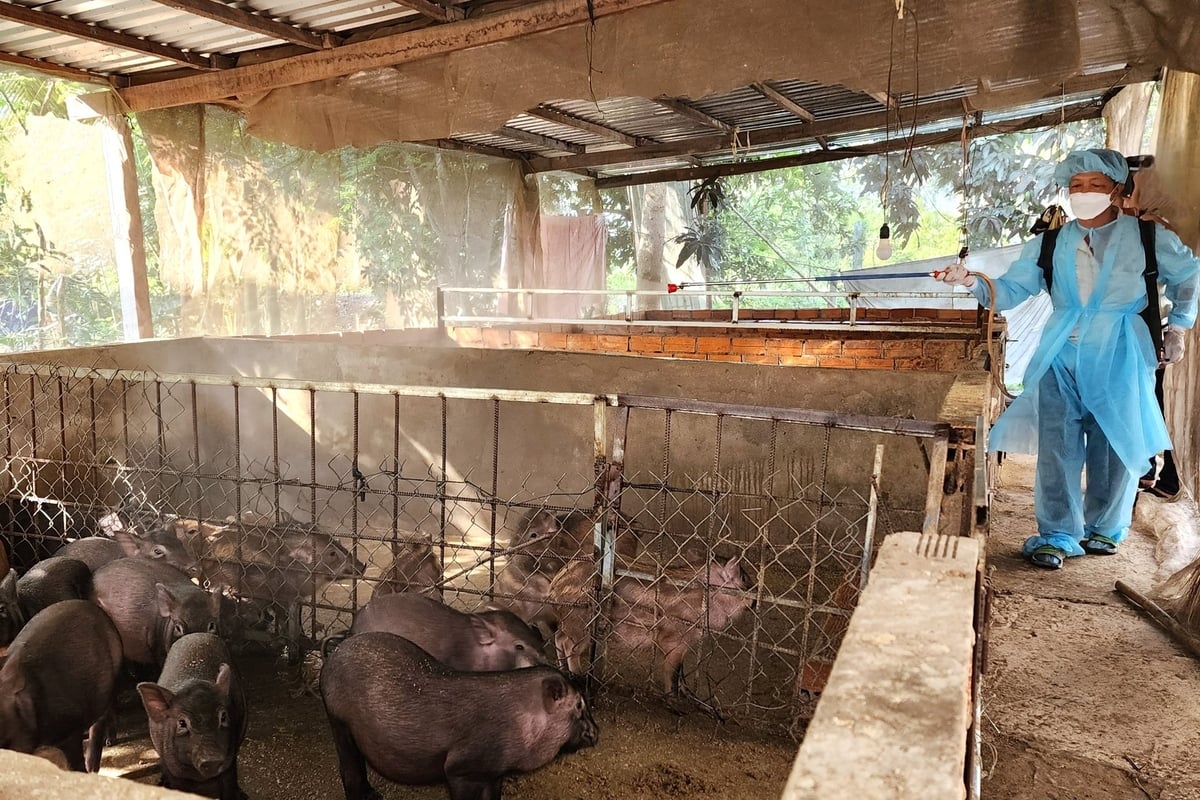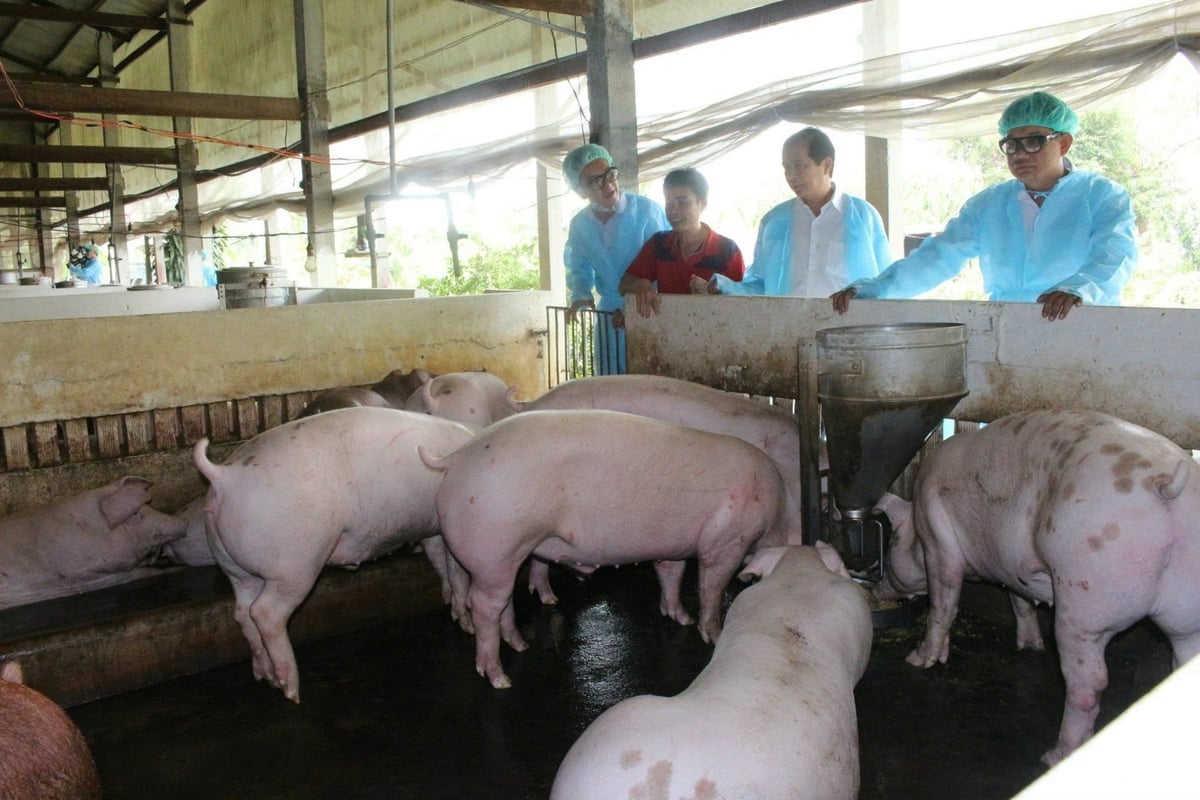December 31, 2025 | 10:42 GMT +7
December 31, 2025 | 10:42 GMT +7
Hotline: 0913.378.918
December 31, 2025 | 10:42 GMT +7
Hotline: 0913.378.918
Statistics from the Department of Agriculture and Environment of Can Tho city show that the total herd of pigs is currently over 487,000. Since the beginning of the year, Can Tho city has had three outbreaks of African swine fever (ASF) with 52 pigs dead and destroyed, equivalent to a loss of nearly 2,000 kg. These new outbreaks occurred in small-scale farms that do not ensure biosecurity.

Animal husbandry and veterinary staff spray disinfectant around the barn to prevent the spread of African swine fever. Photo: Kim Anh.
According to the Can Tho City Sub-Department of Livestock Production and Animal Health, the African swine fever vaccine is not yet on the list of mandatory vaccinations as prescribed. Therefore, the professional sector of this city does not have a legal basis to request funding to support people in vaccinating their livestock. Vaccination is mainly promoted through communication campaigns, mobilization, and recommendations at present, which means livestock farmers still have to carry out the work by themselves.
“The African swine fever vaccine is quite expensive, ranging from VND 60,000 to 65,000 per bottle. It is only injected once during the entire raising process. In addition, currently licensed vaccines are effective for pigs of 4 to 10 weeks of age, while there are no recommendations for vaccination of sows and boars. This is causing difficulties in the prevention of African swine fever,” said Trinh Hung Cuong, Deputy Head of Can Tho City Sub-Department of Livestock Production and Animal Health.
Although there are no exact statistics, Can Tho City Sub-Department of Livestock Production and Animal Health assesses that the vaccination rate against African swine fever is quite low. In order to face the complicated developments of the epidemic, the People's Committee of Can Tho city has recently issued Official Dispatch 279/UBND-KT requesting drastic and synchronous implementation of solutions to prevent and control African swine fever in the area.
One thing to note is that the Chairman of the People's Committee of Can Tho City requested the Department of Agriculture and Environment to strictly handle cases of concealing the outbreaks or slow reporting that lead to the spread of the epidemic.

The majority of pig farms in Can Tho city operate on a small and medium scale. Photo: Kim Anh.
The People's Committees of communes and wards will be responsible to the Chairman of Can Tho City People's Committee if they are negligent and irresponsible in terms of leadership and directing, allowing African swine fever to spread widely and cause great damage.
The leader of Can Tho city also requests that the Department of Agriculture and Environment proactively develop a response scenario in the event of an epidemic, assigning specific tasks to local authorities at the commune and ward levels.
The People's Committees of communes and wards are required to mobilize forces and take the initiative in monitoring work to promptly detect and thoroughly handle outbreaks, while limiting the occurrence of new outbreaks. Local veterinary forces must instantaneously handle and destroy pigs infected or suspected of being infected with ASF.
The specialized sector needs to proactively implement policies to support farmers who suffer losses due to swine disease in accordance with regulations. Prevent and resolutely handle cases of buying, selling, transporting sick pigs, and dumping dead pigs, causing disease spread and environmental pollution. The Chairman of the People's Committee of Can Tho city particularly emphasizes that the arrangement of local organizations and apparatus should not affect the work of disease prevention and control.

Can Tho city creates conditions for small, fragmented livestock farms with no signs of disease to convert into farm-scale livestock farming facilities. Photo: Kim Anh.
Regional Livestock Production and Animal Health Stations (under the Department of Agriculture and Environment of Can Tho city) are responsible for reviewing livestock farms in their areas of management. The unit also needs to assess livestock farming conditions of small and medium-sized farms, thereby providing guidance and facilitating the shift from ineffective farming to farm-scale production.
Veterinary forces need to strengthen quarantine and control of the transportation of pigs and pig products, organize prevention and strict handling of cases of transportation, trading, and slaughter of pigs that do not meet requirements on disease prevention, control, and food safety.
Translated by Samuel Pham

(VAN) From extensive shrimp ponds, baskets of don gathered on the mudflats, to boats carrying visitors to watch birds, all livelihoods here depend on clean water, green forests, and the calls of migratory birds.
/2025/12/26/0703-3-204813_117.jpg)
(VAN) Transparency in information and listening to local people have helped address ground clearance bottlenecks and build social consensus, thereby accelerating the progress of the JICA3 irrigation project.
/2025/12/27/0609-3-233846_327.jpg)
(VAN) The JICA3 project is expected to become a 'water shield,' helping control saltwater intrusion, proactively secure water resources, protect livelihoods, and promote sustainable development in coastal areas.
/2025/12/26/5654-3-164509_655.jpg)
(VAN) As Viet Nam makes strong commitments toward achieving net-zero emissions, controlling and reducing methane emissions in livestock production is increasingly becoming a mandatory requirement.

(VAN) 'People, Primates, Plants: Co-managing Biodiversity and Improving Livelihoods in Vietnam' (the PPP Project) is an international initiative implemented in Vietnam by BGCI, CEGORN, and ICRAF/World Agroforestry.

(VAN) Dak Nong established a risk-level zoning map for coffee, built a digital data platform for the sector, and promoted certified production in line with EUDR.
/2025/12/25/2709-1-211551_295.jpg)
(VAN) In response to the U.S. Marine Mammal Protection Act (MMPA), Gia Lai province is implementing many solutions to protect marine mammals and develop sustainable, responsible fisheries.